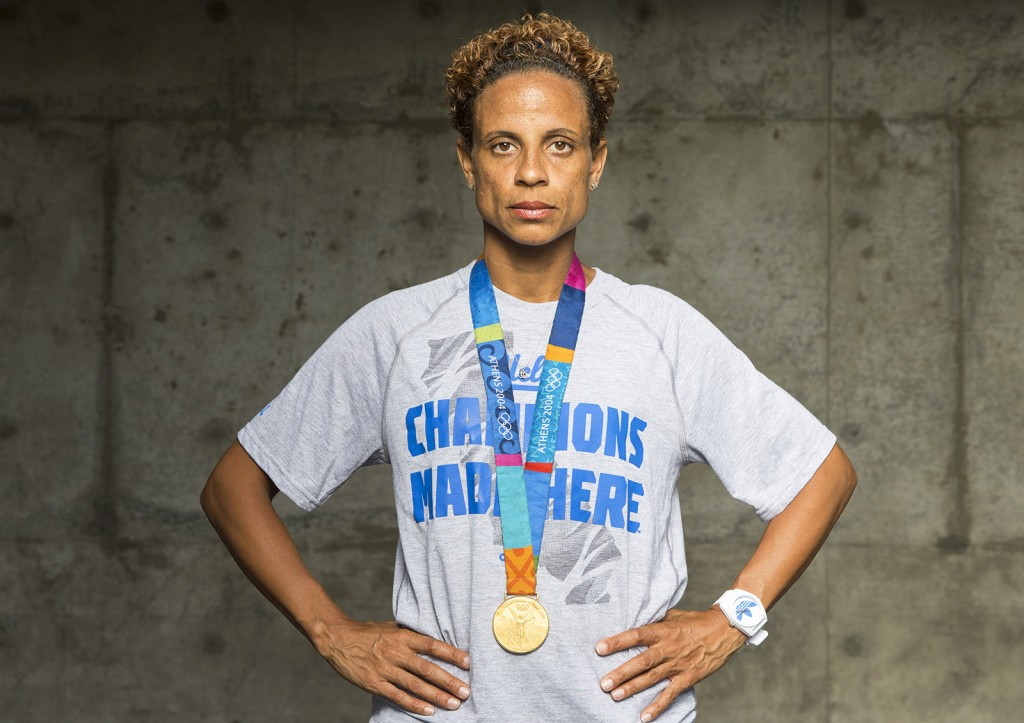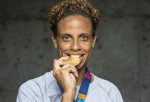Joanna Hayes’ hands shot up the moment she crossed the line – she could barely contain herself.
She was finally an Olympic champion.
Before becoming a gold medalist and Olympic record holder, Hayes endured a roller coaster of a career as a professional hurdler.
Hayes qualified for a youth national championship meet held at UCLA’s campus when she was 12. The runner didn’t know then, but Drake Stadium would become the launch site for her Olympic career. She decided right then that she would win the Olympics, whatever the cost.
Hayes attended John W. North High School in Riverside where she won the state championship in the 100-meter and 300-meter hurdles her senior year.
It wasn’t a surprise when she received multiple Division I scholarships to run, but her college choice would ultimately come down between two rival schools in Los Angeles.
“I’m not going to lie, USC was my most fun recruiting trip,” Hayes said. “But sometimes you go somewhere and you have this feeling. I came (to UCLA) and I knew there was something about this place. Those four letters had to be across my chest.”
The high school standout was enticed by receiving coaching from UCLA’s Bob Kersee, husband and coach to Olympian Jackie Joyner-Kersee. She was unsure of what to expect, as the coach was notorious for his fiery coaching style and loud voice.
“The first time he cussed me out I think cried,” Hayes said. “I mean he used to cuss me out when someone else did something wrong. But the difference between now and then, is that I cried and then got on the line and ran. That’s how Bobby molded me.”
A hyperextended knee in 1997 set Hayes back from achieving more of her collegiate goals, such as winning the NCAA title in the 100-meter hurdles. With those milestones behind her, Hayes decided to up the ante and turn her focus to the Olympics.
“I would do all the exercises needed, my diet was perfect, and I wasn’t just going to go – for me, it was go hard or go home,” Hayes said. “All or nothing, because I had to win.”
Hayes traveled to Sacramento – home of the 2000 Olympic trials – but the races didn’t go as planned. She failed to qualify for the 100-meter hurdles and ran a slower time in the finals than she had in the semifinals.
Still, she had the 400-meter hurdles – the event she was an NCAA champion in just the season before.
Fifty-five seconds later, Hayes’ dreams seemed to be over just as quick as the nature of her races. Despite dropping .35 seconds from her semifinal time, Hayes was fourth again – just one spot and .17 seconds from being an Olympian.
“The pain that I felt getting fourth, it was unbelievable – I can’t even explain it,” Hayes said. “Fourth place is the worst because you are the first person to not go to the Olympics. Everything about that hurt.”
The next two years would only get worse. In 2001, Hayes missed the entire season with a hamstring injury. The following year, she stopped training all together. Suddenly, the idea of running went out the window.
Hayes was distraught. She needed to get away from competition.
Work at Joyner-Kersee’s youth center in East Saint Louis, Illinois, served as a remedy for her adversity. Hayes slowly realized she had a knack for coaching, working with children spanning a variety of ages. It served as a foundation for her future coaching career.
Hayes was still only 25, though. She couldn’t forget the goal she had set for herself 13 years earlier.
“I saw some athletes I used to train with and I knew I wasn’t done,” Hayes said. “So I was like ‘OK I’m coming back.’ It was the hardest thing I’ve ever had to overcome. Without a doubt.”
Returning to the track in 2002 after coaching in East St. Louis, Hayes used the same work ethic she had as an NCAA champion at UCLA toward her comeback for the 2004 Olympics.
Missing the Olympics for a second time just wasn’t an option.

This time around, she placed second in the 100-meter hurdles at the Olympic trials, ready to compete in Athens, Greece.
“There was nobody in the world that could’ve told me, in 2004, that I was not going to win,” Hayes said. “And I wanted the Olympic record. There were just so many signs that year.”
What happened next still leaves Hayes at a loss for words.
Before every race at those Olympic Games, Hayes and silver medalist Darvis “Doc” Patton exchanged motivational texts. In this particular text – on August 24, 2004 – Hayes happened to predict the future.
“Everyday, he would just text me, ‘You ready?’ and I would always respond ‘Damn right,’” Hayes said. “In the final, he sent the message, and I put ‘Damn right’ But after it, I put ‘12.37’. Then he wrote back, ‘Olympic Champ.’”
Then it happened.
She did it. She not only won, but set a then-Olympic record of 12.37 seconds.
“I just never wanted to leave the track,” Hayes said. “I didn’t want to leave the podium, I just wanted to stay there forever. I told myself, ‘Hey, all these people in the stands, they’re cheering for you, and they wanted you to win.’ It was an unreal moment.”
By 2008, Hayes developed another hamstring injury and failed to qualify for the Olympics, limping off the track after a seventh-place finish in the 100-meter hurdles.
After long consideration, she decided it was time for her to hang up the spikes.
Soon after retirement, she began coaching at Harvard-Westlake High School in Los Angeles. She was always coaching, even when she didn’t realize it – just like back in East St. Louis.
In 2010, Hayes decided to start her own family. In December of that year, she gave birth to her daughter Zoe. Instead of taking time off, Hayes brought her newborn baby everywhere she went, from Harvard Westlake practices to various USA Track & Field events.
“I never left her at home, I’d even nurse her between runs,” Hayes said. “She wasn’t going to be in the way – she’s my kid. And it was a lot of fun to do that with her at the end of the day.”
With the competitive spirit still in her, she decided to come back again – this time for reasons bigger than herself. The 35-year-old coach wanted to show her daughter that anything was possible if planned and coupled with hard work – just like her times at UCLA.
“It’s tough because you want to tell them, but you also want to show them,” Hayes said. “Yeah mommy’s old, mommy’s had surgery, mommy hasn’t done this in a while, but you know I’m going to get out there and do my best, and then walk away from something that I loved so much.”
In 2012, she did just that.
Hayes ran her last professional race in Eugene, Oregon – the site of the 2012 Olympic trials. She wrote Zoe’s name on her spikes, and said her daughter’s face didn’t leave her mind the entire race.
Ultimately, Hayes did not make the finals for the trials, let alone qualify for the 2012 Olympics, retiring again after that race in Eugene. But now, Hayes goes back to Eugene every June, where she coaches UCLA track and field athletes aspiring to win national championships.
Her former training partners, Olympians Allyson Felix and Dawn Harper-Nelson, now call her “Bobby Junior” due to her fierce coaching style.
The former gold medalist does her best to not push her athletes too much, but they are aware of the arduous path she’s taken. Sophomore hurdler Kimani Austin-Reese still gets surprised by her achievements on a regular basis.
“I was looking at her in practice one day, listening to her yell at everyone, and I was like ‘Can you bring your gold medal to practice once?’” Austin-Reese said. “When she puts that vision in you, it’s just a matter of going. It’s almost a drive that she flows into you.”
Redshirt senior Kylie Price also works with Hayes a great deal, as she is one of the nation’s top long jumpers and the anchor for the women’s 4×100-meter relay.
“She’s like my second mom away from home,” Price said. “In regards to track, I feel like she’s a coach every female athlete needs because she’s done it all. She went to UCLA, she won the Olympics. My mental state has stayed so strong because she’s my coach.”
Few individuals experience the levels of success and failure she has, few that have even attempted a balance such as the one she achieved in 2012. But the one thing that remains surefire is her never-quit attitude and passion for coaching.
“I gave everything I have to this sport, and if you give everything you have but it still doesn’t work, maybe you try something different,” Hayes said. “But we live this game of ‘Next time I’ll do it’, and before you know it you’re 35 years old talking about ‘next time’. Take advantage of your opportunities, because you have to live in the moment.”
